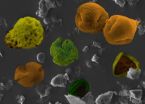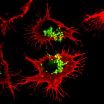WHO: Scientists supported by the National Institute of Allergy and Infectious Diseases (NIAID), part of the National Institutes of Health, will present their latest research findings at the ACAAI Annual Meeting. For more than 60 years, NIAID has supported allergy and immunology research at U.S. and international institutions and conducted studies within its own laboratories to improve the health of millions of people.
WHEN: November 11-16, 2010
WHERE: Room 120BCD, Phoenix Convention Center, Ariz., Press Room 121B
Presentation Highlights:
Below are advance summaries of selected presentations describing NIAID-funded research. This information is embargoed until the scheduled time of presentation, as noted below.
Sneak Preview of the Guidelines for the Diagnosis and Management of Food Allergy in the United States
Food allergies affect approximately 5 percent of children and 4 percent of adults in the United States and may be increasing in prevalence. Despite the risk of severe allergic reactions and even death, currently no specific treatments exist for food allergies, and the disease can be managed only by avoiding the allergen or treating the symptoms. Moreover, the diagnosis and management of food allergies can vary from one clinical practice to another, and patients frequently confuse nonallergic food reactions, such as food intolerance, with food allergies. In response to these issues, NIAID, working with 34 professional medical organizations, federal agencies and patient advocacy groups, led the development of clinical guidelines for the diagnosis and management of food allergy. These guidelines are intended for use by a wide variety of healthcare professionals. Topics addressed include the epidemiology, natural history, diagnosis and management of food allergy, including the management of severe symptoms such as anaphylaxis. Although the guidelines will not be published until December 2010, Matthew Fenton, Ph.D., from NIAID's Division of Allergy, Immunology and Transplantation, will provide a preview of the guidelines.
Title: Symposium: What is New in Food Allergy?
Presenter: Matthew Fenton, Ph.D., NIAID, Bethesda, Md.
When: Sunday, Nov. 14, 2010, 3:30 p.m. Mountain Time
Press Briefing: Monday, Nov. 15, 2010, 9:00 a.m. Mountain Time
Issues and Advances in Primary Immunodeficiency Relevant to Allergists
Primary immunodeficiency diseases (PIDDs) are usually caused by genetic defects in the cells of the immune system. Typically these inherited genetic defects are identified because an individual has an increased susceptibility to infection and cancers. In addition, patients may have autoimmune, growth, skin and bowel problems. Steven Holland, M.D., will discuss the relationship between two specific PIDDs, hyper-immunoglobulin E (IgE) recurrent infection syndrome (also known as Job's syndrome) and DOCK8 deficiency and approaches to treatment. Both syndromes are characterized by increased levels of IgE antibodies, superficial and systemic bacterial and fungal infections, and eczema. Diseases of IgE regulation are important to recognize and diagnose because they have distinct, manageable symptoms. Moreover, because these diseases involve the regulation of IgE, a key molecule thought to be involved in asthma and allergy, they also can help researchers better understand what drives asthma and allergic diseases.
Title: General Session: Current Understanding of Primary Immunodeficiency Associated with Elevated IgE
Presenter: Steven Holland, M.D., NIAID, Bethesda, Md.
When: Saturday, Nov. 13, 2010, 11:00 a.m. Mountain Time
The Great Atopic Dermatitis (Eczema) Debate
Atopic dermatitis, also known as eczema, is a chronic skin disorder associated with dry, itchy skin. People with atopic dermatitis are prone to persistent viral and bacterial skin infections and can have scaly lesions on their face, neck and hands that weep clear fluid. Severe complications of atopic dermatitis include eczema herpeticum, a skin infection caused by herpes virus, and eczema vaccinatum, a skin infection caused by vaccinia virus, which is used in the smallpox vaccine. The panelists, who treat patients with atopic dermatitis, will discuss what factors play major roles in the development, complications and clinical features of the disease.
Title: General Session: The Great Atopic Dermatitis (AD) Raft Debate: The Greatest Role in Pathophysiology of AD
Panelists: Mark Boguniewicz, M.D., National Jewish Health, Denver
Mitchell Grayson, M.D., Children's Hospital of Wisconsin, Milwaukee
Donald Leung, M.D., National Jewish Health, Denver
Lawrence Schwartz, M.D., Ph.D., Virginia Commonwealth University, Richmond
When: Saturday, Nov. 13, 2010, 1:30 p.m. Mountain Time
### Additional information about the ACAAI Annual Meeting can be found at http://www.acaai.org/about/Pages/AnnualMeeting.aspx. Members of the media can register to attend at http://www.acaai.org/press/Documents/ACAAI_MediaRegForm2010.pdf.
Contact:
For more information or to schedule an interview with one of our expert researchers, please contact William Crews or Julie Wu in the NIAID Office of Communications at (301) 402-1663, or niaidnews@niaid.nih.gov.
NIAID conducts and supports research—at NIH, throughout the United States, and worldwide—to study the causes of infectious and immune-mediated diseases, and to develop better means of preventing, diagnosing and treating these illnesses. News releases, fact sheets and other NIAID-related materials are available on the NIAID Web site at http://www.niaid.nih.gov.
The National Institutes of Health (NIH)—The Nation's Medical Research Agency—includes 27 Institutes and Centers and is a component of the U. S. Department of Health and Human Services. It is the primary federal agency for conducting and supporting basic, clinical and translational medical research, and it investigates the causes, treatments and cures for both common and rare diseases. For more information about NIH and its programs, visit http://www.nih.gov.
END



